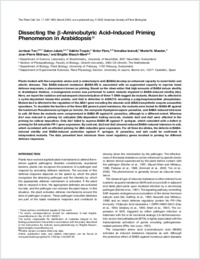Dissecting the ß-aminobutyric acid–induced priming phenomenon in Arabidopsis
- Ton, Jurriaan Laboratory of Biochemistry, Department of Science, University of Neuchâtel, Switzerland - Section of Phytopathology, Faculty of Biology, Utrecht University, The Netherlands
- Jakab, Gabor Laboratory of Biochemistry, Department of Science, University of Neuchâtel, Switzerland - Plant Biology Department of Biology, University of Fribourg, Switzerland
- Toquin, Valérie Plant Biology Department of Biology, University of Fribourg, Switzerland
- Flors, Victor Laboratory of Biochemistry, Department of Science, University of Neuchâtel, Switzerland
- Iavicoli, Annalisa Plant Biology Department of Biology, University of Fribourg, Switzerland
- Maeder, Muriel N. Plant Biology Department of Biology, University of Fribourg, Switzerland
- Métraux, Jean-Pierre Plant Biology Department of Biology, University of Fribourg, Switzerland
- Mauch-Mani, Brigitte Laboratory of Biochemistry, Department of Science, University of Neuchâtel, Switzerland
-
18.02.2005
Published in:
- The Plant Cell. - 2005, vol. 17, no. 3, p. 987-999
English
Plants treated with the nonprotein amino acid ß-aminobutyric acid (BABA) develop an enhanced capacity to resist biotic and abiotic stresses. This BABA-induced resistance (BABA-IR) is associated with an augmented capacity to express basal defense responses, a phenomenon known as priming. Based on the observation that high amounts of BABA induce sterility in Arabidopsis thaliana, a mutagenesis screen was performed to select mutants impaired in BABA-induced sterility (ibs). Here, we report the isolation and subsequent characterization of three T-DNA–tagged ibs mutants. Mutant ibs1 is affected in a cyclin-dependent kinase–like protein, and ibs2 is defective in AtSAC1b encoding a polyphosphoinositide phosphatase. Mutant ibs3 is affected in the regulation of the ABA1 gene encoding the abscisic acid (ABA) biosynthetic enzyme zeaxanthin epoxidase. To elucidate the function of the three IBS genes in plant resistance, the mutants were tested for BABA-IR against the bacterium Pseudomonas syringae pv tomato, the oomycete Hyaloperonospora parasitica, and BABA-induced tolerance to salt. All three ibs mutants were compromised in BABA-IR against H. parasitica, although to a different extent. Whereas ibs1 was reduced in priming for salicylate (SA)-dependent trailing necrosis, mutants ibs2 and ibs3 were affected in the priming for callose deposition. Only ibs1 failed to express BABA-IR against P. syringae, which coincided with a defect in priming for SA-inducible PR-1 gene expression. By contrast, ibs2 and ibs3 showed reduced BABA-induced tolerance to salt, which correlated with an affected priming for ABA-inducible gene expression. For all three ibs alleles, the defects in BABA-induced sterility and BABA-induced protection against P. syringae, H. parasitica, and salt could be confirmed in independent mutants. The data presented here introduce three novel regulatory genes involved in priming for different defense responses.
- Faculty
- Faculté des sciences et de médecine
- Department
- Département de Biologie
- Language
-
- English
- Classification
- Biological sciences
- License
-
License undefined
- Identifiers
-
- RERO DOC 4135
- DOI 10.1105/tpc.104.029728
- Persistent URL
- https://folia.unifr.ch/unifr/documents/299750
Statistics
Document views: 228
File downloads:
- Texte intégral: 308
